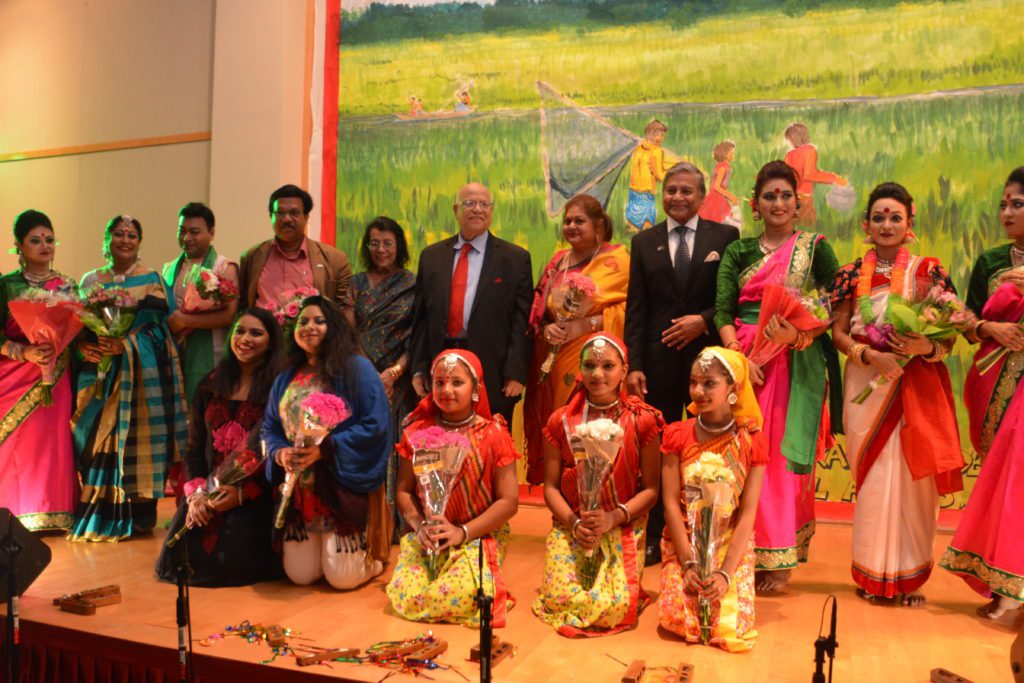Skipping the Game for an Embassy Evening
By • October 16, 2017 0 619

Sometimes we forget.
Thursdays aren’t usually big-ticket, big-event nights in Washington, but Thursday, Oct. 12, was a hot night in the District of Columbia.
The Wharf opened in Southwest to anticipated fanfare and an outpouring of locals, media coverage, music and food consumption.
Not to forget — or maybe we’d like to — the Washington Nationals gave another live performance of “Mighty Casey Has Struck Out,” failing once again to get past a fifth game in the National League playoffs, losing to the defending-champion Chicago Cubs down the road a piece in another gut-wrenching, four-hour-plus epic loss, 9-8.
The whole city was buzzing over these two events. But sometimes we forget.
There are other things to do in Washington.
Did you know there are 177 embassies in Washington?
We knew this. But still. We heard of a man who gave up his two tickets to the Nationals game to be somewhere else, and it wasn’t a family emergency.
He chose to hang out at the Embassy of Bangladesh, a country with an ancient and dramatic history, which was hosting a Celebration of Bangladesh featuring performers from the Bangladesh Shilpakala Academy of Fine and Performing Arts, the principal state-sponsored national cultural center. Also performing were dancers from Shristee Nrittyangon, a Maryland-based nonprofit dance school run by Rosemary Mitu Gonsalves since 2012.
The event was organized by the Charities Aid Foundation of America and Diaspora Gives Bangladesh, as well as by the Embassy Series, a nonprofit international concert series held in Washington embassies and ambassadors’ residences. The series was founded in 1994 by Jerome Barry to “unite people through musical diplomacy.”
This was an evening of networking, of exotically flavored cultural socializing, in the modern architectural setting of International Drive, a circle and in-gathering of embassies off Van Ness dominated by the Embassy of China. In the scheme of things local (the Wharf, the game) or national (the series of natural and human disasters that have caught the attention of our hearts and minds), a night out at an embassy of a country — if not a galaxy, far, far away — wouldn’t amount to much.
And yet, it did. Perhaps because of the exhausting news, or the ballyhooed events, the program at the Embassy of Bangladesh seemed to matter in a not discordant but comforting way.
Bangladesh has a portion of the news these days with its neighbor Myanmar, formerly Burma, from where thousands of refugees have streamed into Bangladesh.
This was a fact alluded to by Ambassador Mohammad Ziauddin in his eloquent welcoming speech. It was a speech that made you remember that we don’t stand alone in our history or in our politics, something that the unique presence of the international community always tends to do, if only we notice.
The ambassador painted a picture of a country — predominantly Muslim (about 86 percent), but nonetheless diverse in its religious and cultural aspects — created in the breakup of the colonial world. Formerly East Pakistan, Bangladesh became independent in 1971 after a bloody war.
The ambassador mentioned the crossroads aspect of Bangladesh and its flourishing, almost worshipping culture of the arts. He said that his country was a country of diversity, that it was a welcoming country, a country of resiliency marked by tragedy both natural and man-made.
In his words, you could hear the violent roar of the Ganges on the loose and sense the importance of the river in the lives of the people. This is a country of boats and currents and festivals, a large part of the breathing in and out connected to water and its rituals. As you watched the dancers in their movements, reflecting daily life, pride, going to the river, exploring the haunted, dense and beautiful forest, you could see the Himalayas, hear the sound of warring factions, imagine the skylines of ancient buildings.
Ambassador Ziauddin seems the sort of man who was born to the job. You could easily drift into a philosophic discussion with this articulate man about the turbulent state of modern humankind, and be stimulated like an echo later on.
This happens quite a lot in the scattered Washington world of embassies and ambassadors. Cultural centers dot the city, providing opportunities to connect to places which are not as immediate as our neighborhood but, through contact, music, art, by sharing a drink, cuisine, stories and jokes, become intimate.
It happens in the aftermath of tragedies, it happens at celebrations of anniversaries marking the birth and merging of nations — on those occasions when we become bigger than our polarities and emerge for a while recognizable to one other.
As for the Wharf: See you soon. As for the Nationals: Go Redskins.

